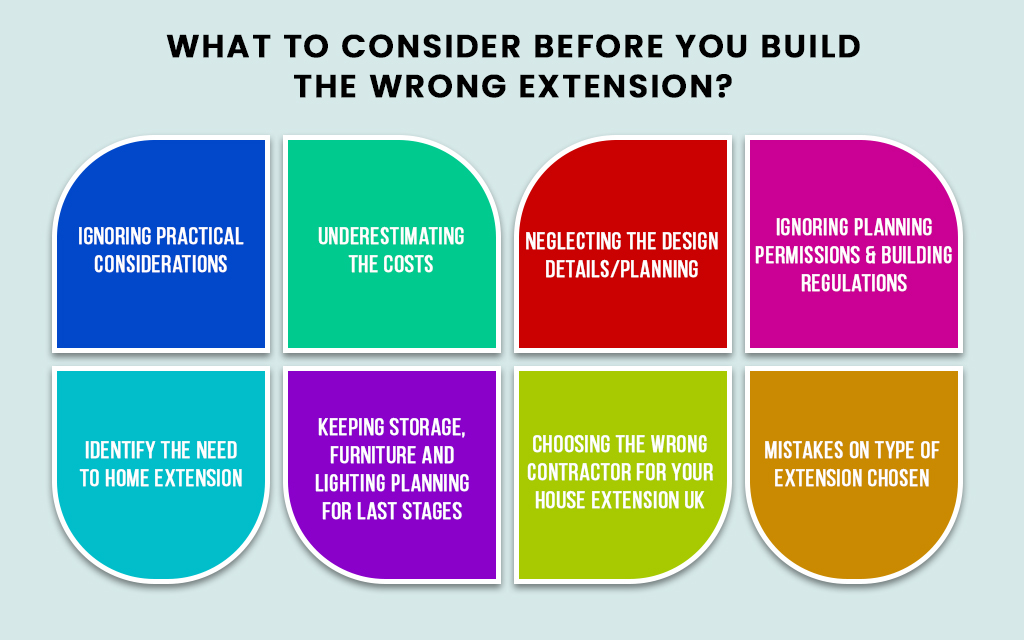Home extensions come with a host of benefits such as more space, increase property value, improved functionality, and ease of life.
But, at the same point we all fear making mistakes during the extension because a single blip may avalanche into double the money, time and efforts.
So, here we’ve compiled some most common mistakes to avoid when extending your home that shall ensure perfect extension and zero hassles.
Also, read on how to find out that the home is suitable for extension or not.
What to consider before you build the wrong extension?
Have a look at the following mistakes that you need to consider before you build your home extension.
Identify the need to Home Extension
Before heading to home extension, it’s always better to re-evaluate the space and layout. Sometimes, small rearrangement could help create a more room space that may pull the things together and you may not need to extend.
But, if you constantly feel cramped or cluttered and need more room for storage/entertaining guests? or, planning to start a family.
If so, an extension may be a viable option.
Ignoring practical considerations
Factors such as the location of your home, its size, ventilation, lighting, and the British weather all play a crucial role in determining the feasibility and success of your house extension.
Ignoring these practical considerations can lead to issues with the extension, such as poor ventilation, inadequate lighting, or high energy costs, that could have been easily avoided.
Consulting with professionals such as architects or builders can help you identify and address these practical considerations before undertaking a home extension.
Underestimating the costs
Home extensions can be expensive, and failing to plan the budget properly for the project can lead to cost overruns and financial stress.
When planning an extension house UK, it’s important to consider all the costs involved, including design and planning fees, building costs, contingency budget and any additional expenses such as new furniture or appliances.
Underestimating the costs of a home extension can lead to compromises in the quality of the materials used or the workmanship, which can ultimately affect the value and functionality of your home.
It’s always better to go for 3D visualizations or consult professionals to get a more appropriate budget and time estimate.
Keeping Storage, Furniture and lighting planning for last stages
These elements are crucial for creating a functional and comfortable living space, and keeping their planning for last stages can lead to costly mistakes or compromises in the design.
Considering storage, furniture, and lighting needs early in the planning stages of your house extension will allow you to incorporate them into the design and ensure that they are seamlessly integrated into the space and stay in budget.
Consult with professionals such as interior designers or builders to help you plan for these elements and avoid any costly mistakes.
Choosing the wrong contractor for your house extension UK
Cowboy builders may lack the necessary experience and expertise to complete the project to a high standard, resulting in subpar workmanship or even safety hazards.
It’s vital to do the research and choose a reputable contractor with a proven track record of successful home extensions.
Also, get a detailed, written contract outlining the scope of the work, timelines, and payment terms. Click here to know more on how to identify and get Rid of Cowboy Builders.
By taking time to choose the best home extension contractor, you can ensure that your home extension is completed to a high standard and without any unnecessary stress or costs.
Neglecting the design details/planning
Design details such as material selection, colour schemes, and fixtures can make a big difference in the overall look and feel of your new space.
Neglecting these details can result in a lackluster or inconsistent design that doesn’t meet your expectations.
Plan out the design details of your home extension early in the process. Work with a professional designer or architect to create a cohesive design that aligns with your vision and meets your practical needs.
By prioritizing design details and planning carefully, you can ensure that your home extension is not only functional but also aesthetically pleasing and in line with your personal style.
Ignoring planning permissions and building regulations
Failure to obtain the necessary approvals can result in fines, legal complications, and even the demolition of the extension.
Consult with your local planning department early in the planning process as they can advise you on the necessary permits and regulations that you need to comply with.
Working with a reputable contractor who is familiar with building regulations ensures that your project meets all necessary requirements.
With proper planning and obtaining the necessary approvals, you can avoid costly delays and ensure that your home extension is completed to a high standard.
Mistakes on type of extension chosen
Glass extension house
Be mindful of the amount of direct sunlight that will enter the extension and consider adding shading to prevent overheating. Consider the privacy of the space, especially if it is visible from neighbouring properties.
Keep in mind that glass extensions may require more maintenance than traditional extensions.
House rear extension
Consider how the extension will impact your outdoor space, such as your garden or patio. Think about how the new space will connect with the existing space and how it will affect natural light and ventilation.
Keep in mind any building regulations that may impact the design and construction of the extension.
Wood extension to house
Choose high-quality, durable materials that can withstand weather and other environmental factors. Consider the overall aesthetic of the property and ensure the extension complements it.
Keep in mind any potential maintenance requirements for wooden extension to house.
How to find out if you can extend your house?
Considering house extension UK and want to be sure that the project is feasible and complies with local regulations.
Let’s have a look at how to find out if you can extend your house in the UK:
Check with the local council for building regulations and permitted development
The local council can provide information on planning policies and regulations that may affect your ability to extend your house.
This includes regulations such as the National Planning Policy Framework and the local development plan. To contact the local council, you can visit the council website or contact a planning officer.
Consider the impact on the surrounding area
A well-designed extension can enhance the value of your home and the surrounding area, while a poorly designed extension can detract from the value and appeal of the area.
To assess the impact of your extension on the surrounding area in the UK, you can check for conservation area or listed building restrictions, consult with an architect, and take photos of the property from different angles.
Assess the size and shape of your property
Factors such as the size of your garden, the layout of your existing property, and the location of boundary lines will impact your extension plans.
Different types of extensions may be suitable for different property sizes and shapes in the UK. For example, a single-storey rear extension may be suitable for a small property, while a double-storey side extension may be suitable for a larger property.
Determine the type of extension you want
While going for home extension consider the purpose/need of the extension and how it will fit with the existing structure of your home.
For example, a double-story extension may provide more space but will require more planning and may be more expensive than a single-story extension.
A garage extension may be a great option if you’re looking to add more storage space or convert it into a room, but you’ll need to consider the impact on your driveway and any necessary changes to the structure of your home.
What if you don’t want to lose garden space?
If you’re concerned about losing garden space, there are several options to consider.
A wrap-around extension, which extends around the side of your home, can provide additional living space without taking up too much garden space.
Another option is a garden room, which is a detached structure that can be used as additional living space, gym, hobby room or office.
Keep in mind that there may be additional regulations to consider with a garden room, such as the height and size of the structure.
Consider the age and style of your home
Older homes or those with unique architectural features may have more restrictions when it comes to extending.
A professional architect or builder can guide you on how to determine what is possible and what regulations you’ll need to follow for old house modern extension.
Impact on your neighbours
If your extension will impact your neighbours, you may need to inform them and get their consent as the extension may affect their view or access to light.
You may need to undergo a Party Wall Act to gain a mutual consent for extension from your neighbours if you have any shared wall.
Check for any restrictions or covenants on your property:
Your property may have restrictions or covenants that limit what you can do with your home. For example, you may be limited in the height or size of your extension or may need to use certain materials.
Importance of finding right contractor company for your extension
Undertaking a house extension project is a significant investment, both financially and emotionally. Finding the right contractor company ensures a successful project.
Here are some of the reasons why:
Avoiding Rework and Cost Overruns
Choosing the wrong contractor company can lead to poor workmanship, which may result in rework and cost overruns. A reputable construction company with experience in house extension projects will ensure that the work is done right the first time, helping you avoid costly mistakes.
Staying on Schedule
One of the biggest challenges in any house extension project is staying on schedule. A good contractor company will provide you with a realistic timeline for the project and will work to keep the project on track.
They will have the necessary project management skills to coordinate the various tradespeople and materials involved in the project.
Compliance with Building Regulations
There are strict building regulations that must be adhered to when undertaking a house extension project in the UK.
A reputable contractor company will have the necessary knowledge and expertise to ensure that your extension is compliant and that all necessary approvals and permits are obtained.
Avoiding Legal Issues
Working with a reputable contractor company can help you avoid legal issues down the line. They will have the necessary insurance and licenses to protect you in case of any accidents or damages that occur during the project.
Quality of Work
A good contractor company will be committed to delivering high-quality workmanship. They will use high-quality materials and employ skilled tradespeople to ensure that your house extension is built to last.
How TEL Constructions helps you?
Looking for a reliable and experienced contractor company for your house extension project, look no further than TEL Constructions.
Our team has a wealth of expertise and experience in house extension projects, and we are committed to delivering high-quality workmanship while staying on schedule and within budget.
We understand the importance of complying with building regulations and avoiding legal issues, which is why we ensure constructing projects considering all necessary permits, approvals and regulations.
Ready to turn your house extension ideas into reality, contact us today at 020 8158 4006 or drop a line at support@telconstructions.co.uk.








